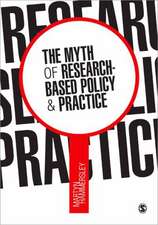Foundations of Qualitative Research: Interpretive and Critical Approaches
Autor Jerry W. Willisen Limba Engleză Paperback – 26 mar 2007
| Toate formatele și edițiile | Preț | Express |
|---|---|---|
| Paperback (1) | 718.52 lei 6-8 săpt. | |
| SAGE Publications – 26 mar 2007 | 718.52 lei 6-8 săpt. | |
| Hardback (1) | 1089.97 lei 6-8 săpt. | |
| SAGE Publications – 26 mar 2007 | 1089.97 lei 6-8 săpt. |
Preț: 718.52 lei
Preț vechi: 984.27 lei
-27% Nou
Puncte Express: 1078
Preț estimativ în valută:
137.49€ • 143.55$ • 113.79£
137.49€ • 143.55$ • 113.79£
Carte tipărită la comandă
Livrare economică 04-18 aprilie
Preluare comenzi: 021 569.72.76
Specificații
ISBN-13: 9781412927413
ISBN-10: 1412927412
Pagini: 392
Ilustrații: black & white illustrations
Dimensiuni: 187 x 232 x 21 mm
Greutate: 0.64 kg
Ediția:New ed.
Editura: SAGE Publications
Colecția Sage Publications, Inc
Locul publicării:Thousand Oaks, United States
ISBN-10: 1412927412
Pagini: 392
Ilustrații: black & white illustrations
Dimensiuni: 187 x 232 x 21 mm
Greutate: 0.64 kg
Ediția:New ed.
Editura: SAGE Publications
Colecția Sage Publications, Inc
Locul publicării:Thousand Oaks, United States
Recenzii
"Willis catches the student up on relevant aspects of philosophy, empiricism, history, and prevailing political influences. This building of chronology is so valuable for students in understanding the origins of specific schools of thought in relations to a paradigm."
—Heather T. Zeng, NACADA
—Heather T. Zeng, NACADA
Cuprins
Chapter 1: World Views, Paradigms, and the Practice of Social Science Research
Case 1. Quantitative Research
Case 2. Qualitative Research
Thinking about the Foundations and Practice of Research
What This Book Is and Is Not About.
What Warrants Our Attention?
The Traditional Canon
Alternative Paradigms
New Techniques or New Paradigms?
Chapter 2: History and Context of Paradigm Development
Positivism: A Response to Metaphysical and Magical Explanations
Critical Theory: A Response to Inequities in Society
Interpretivism: A Response to the Excesses of “Scientific” Social Science
The Special Cases of Postmodernism and Feminism
Chapter 3: Foundational Issues: Postpositivist and Critical Perspectives
Social Science Research: The View from the Postpositivist Paradigm
Social Science Research: The View from the Critical Theory Paradigm
Chapter 4: History and Foundations of Interpretivist Research
(1) Nature of Reality.
(2) Purpose of Research.
(3) Acceptable Methodology/Data.
(4) The Meaning of Data
(5) Relationship of Research to Practice.
The Implications of an Interpretivist Approach
What Sorts of Research are Worthwhile?
Examples of Interpretive Research
Chapter 5: Frameworks for Qualitative Research
Postpositivist Research
“Moments” of Qualitative Research
Some General Frameworks for Qualitative Research
Chapter 6: General Guidelines for Qualitative Research
Guidelines for Qualitative Research
Situated or Contextual Understanding, Not Truth, is the Purpose of Research
Accept Multiple Sources of Influence
Take A Foundational Rather Than Technique Perspective
Practice Recursive (Iterative ) and Emergent Data Collection and Analysis
Use Multiple Sources of Data
Think of Research as a Reflective Process
The Researcher is the Primary Tool for Data Collection and Analysis
An Emphasis on Participatory versus Nonparticipatory Research.
Adopt an Open Approach
Deal With Bias Directly
Select Natural Contexts for Research
Research Should be Holistic, Not Atomistic
Research Involves More Than Induction and Deduction: Analogical Reasoning, Abduction, and Family Resemblances
Alternatives to Postpositivist Criteria for Believability: Validity and Reliability
Alternative Approaches to Validity and Reliability: Triangulation and More
Conclusions? Aren’t They Generalizations?
Chapter 7: Methods of Qualitative Research
Case 1: Action Research on a Pediatric Surgical Ward
Established Qualitative Research Methods
Ethnography
Case Studies: Another Form of Qualitative Observation
Interview Research
Historigraphy
Historiography: The Research Methods of History Innovative Methods
Participatory Qualitative Research
Emancipatory Research
Critical Emancipatory Action Research
Chapter 8: Approaches to Data Analysis and Intepretation
The Purpose of Research
General Theory
Objective Description
Hermeneutic (Verstehen) Understanding
Story telling/Narrative
Data Analysis Families
Eyeballing the Data
Connoisseurship: A Global Perspective
Hermeneutics as a Data Analysis Method
Grounded Theory
Analytic Induction
A Final Topic: The Ethics of Research
Chapter 9: 21st Century Social Science: Peering into the Future
Will the Cacophony Continue?
Why Can’t Social Science Converge on The Answer?
Competition
Linearity
Dialog as an Alternative to Competition
Three Approaches to Knowing in Greek Thought
Plato
Aristotle
The Humanities
Choices 20th Century Social Science Made
Suppose We Chose Badly
Two Theories That May Help Us Build 21st Century Social Science
Poetic Logic
Chaos and Complexity Theory: Another Route to a Nonlinea Social Science
Case 1. Quantitative Research
Case 2. Qualitative Research
Thinking about the Foundations and Practice of Research
What This Book Is and Is Not About.
What Warrants Our Attention?
The Traditional Canon
Alternative Paradigms
New Techniques or New Paradigms?
Chapter 2: History and Context of Paradigm Development
Positivism: A Response to Metaphysical and Magical Explanations
Critical Theory: A Response to Inequities in Society
Interpretivism: A Response to the Excesses of “Scientific” Social Science
The Special Cases of Postmodernism and Feminism
Chapter 3: Foundational Issues: Postpositivist and Critical Perspectives
Social Science Research: The View from the Postpositivist Paradigm
Social Science Research: The View from the Critical Theory Paradigm
Chapter 4: History and Foundations of Interpretivist Research
(1) Nature of Reality.
(2) Purpose of Research.
(3) Acceptable Methodology/Data.
(4) The Meaning of Data
(5) Relationship of Research to Practice.
The Implications of an Interpretivist Approach
What Sorts of Research are Worthwhile?
Examples of Interpretive Research
Chapter 5: Frameworks for Qualitative Research
Postpositivist Research
“Moments” of Qualitative Research
Some General Frameworks for Qualitative Research
Chapter 6: General Guidelines for Qualitative Research
Guidelines for Qualitative Research
Situated or Contextual Understanding, Not Truth, is the Purpose of Research
Accept Multiple Sources of Influence
Take A Foundational Rather Than Technique Perspective
Practice Recursive (Iterative ) and Emergent Data Collection and Analysis
Use Multiple Sources of Data
Think of Research as a Reflective Process
The Researcher is the Primary Tool for Data Collection and Analysis
An Emphasis on Participatory versus Nonparticipatory Research.
Adopt an Open Approach
Deal With Bias Directly
Select Natural Contexts for Research
Research Should be Holistic, Not Atomistic
Research Involves More Than Induction and Deduction: Analogical Reasoning, Abduction, and Family Resemblances
Alternatives to Postpositivist Criteria for Believability: Validity and Reliability
Alternative Approaches to Validity and Reliability: Triangulation and More
Conclusions? Aren’t They Generalizations?
Chapter 7: Methods of Qualitative Research
Case 1: Action Research on a Pediatric Surgical Ward
Established Qualitative Research Methods
Ethnography
Case Studies: Another Form of Qualitative Observation
Interview Research
Historigraphy
Historiography: The Research Methods of History Innovative Methods
Participatory Qualitative Research
Emancipatory Research
Critical Emancipatory Action Research
Chapter 8: Approaches to Data Analysis and Intepretation
The Purpose of Research
General Theory
Objective Description
Hermeneutic (Verstehen) Understanding
Story telling/Narrative
Data Analysis Families
Eyeballing the Data
Connoisseurship: A Global Perspective
Hermeneutics as a Data Analysis Method
Grounded Theory
Analytic Induction
A Final Topic: The Ethics of Research
Chapter 9: 21st Century Social Science: Peering into the Future
Will the Cacophony Continue?
Why Can’t Social Science Converge on The Answer?
Competition
Linearity
Dialog as an Alternative to Competition
Three Approaches to Knowing in Greek Thought
Plato
Aristotle
The Humanities
Choices 20th Century Social Science Made
Suppose We Chose Badly
Two Theories That May Help Us Build 21st Century Social Science
Poetic Logic
Chaos and Complexity Theory: Another Route to a Nonlinea Social Science
Notă biografică
Jerry W. Willis (PhD, University of Alabama, Clinical Psychology) is Associate Dean for Research in the College of Education at Louisiana State University. Prior to joining LSU, he was Professor of Curriculum and Instruction Technology in the Department of Curriculum and Instruction and Chief Scientist in the Center for Technology in Learning and Teaching at Iowa State University. Dr. Willis has been teaching qualitative research for many years, and has written numerous articles and book chapters on qualitative methods. He has written more than 50 books, conference proceedings and software tutorials, the majority of these works related to teacher education, technology, and higher education. He is also the Editor for the International Journal of Innovation in Higher Education, the Founding Editor of the Journal of Technology and Teacher Education, and the Founder of the Society for Information Technology and Teacher Education, which will host its 17th annual conference this year.
Descriere
Foundations of Qualitative Research introduces key theoretical and epistemological concepts replete with historical and current real-world examples. Author Jerry W. Willis provides an invaluable resource to guide the critical and qualitative inquiry process written in an accessible and non-intimidating style that brings these otherwise difficult concepts to life.








